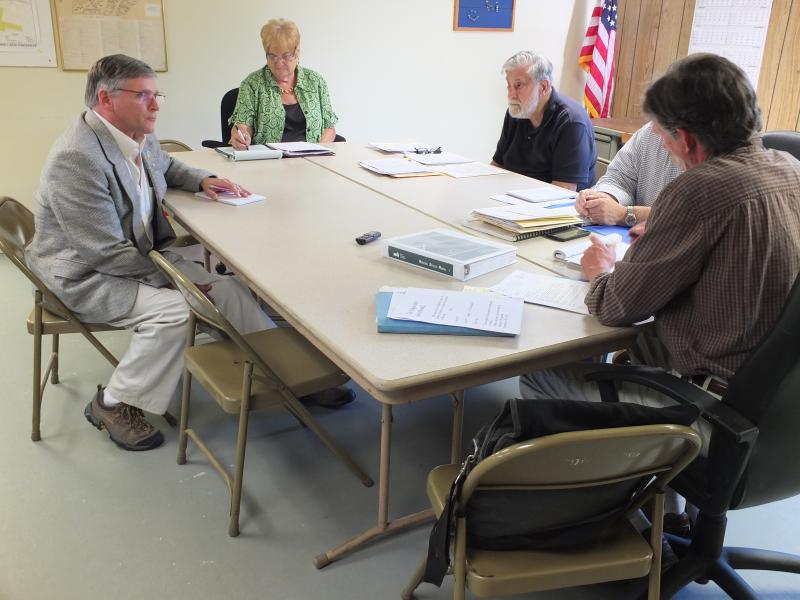Senator updates selectmen on legislative matters
Edgecomb town officials believe the Maine Department of Transportation’s maintenance lot on U.S. Route 1 needs to move, and they want State Sen. Chris Johnson’s help. The Somerville Democrat agreed to schedule a joint meeting between DOT Commissioner David Bernhardt, selectmen and himself to discuss the town acquiring the property. Johnson was the selectmen’s guest during the June 20 board meeting.
He is the third elected official to meet with the selectmen in the past year. County Commissioner Hamilton Meserve (R-Southport) attended a meeting last September and State Representative Stephanie Hawke (R-Boothbay Harbor) discussed transportation issues in December.
Selectman Mike Smith believes it’s unlikely the DOT would leave the maintenance lot’s current location, but Smith wanted to send state officials a message that the town is interested in the property for economic or recreational development.
“We’d love to at least have a conversation with them about it,” Smith said. “They need to find some other location besides coveside water frontage for their maintenance lot. This would be a great site for economic development so we’d like to initiate a conversation about what steps to take.”
Johnson promised to invite Bernhardt and DOT Region 2 Manager Mike Burns to a future selectmen’s meeting.
The selectmen were also concerned about the state’s plans for financing the county jail system. Johnson explained the legislature may reconvene for a special session this fall to discuss changing the financial relationship between the state and 15 county jails. Johnson wants the state to lift the cap it pays for housing prisoners in county jails.
Johnson believes the current situation requires local property tax payers to bear too much of county jail costs.
“The jails are in a pinch,” Johnson said. “If the state is not providing funding then let them charge within reason. If not, then counties are forced to raise money locally which is what the governor is pushing.”
The selectmen are also seeking more state aid for local school funding and special education programs. This year, the town approved a $2,664,336 school budget which accounts for 68.17 percent of municipal spending.
The school budget increased by $125,154 this year. Special education costs rose $117,632, accounting for 94 percent of the school budget’s increase. The $441,465 special education budget includes $25,917 for a new, one-on-one educational technician, $66,320 for six students’ tuition, and $18,247 for increased contractual services for occupational and physical therapy. Smith characterized both regular and special education funding as becoming more difficult for small towns to fund.
He wanted the state to begin funding 55 percent of all local education costs and 100 percent of special education costs as required by a 2004 state referendum. The Legislature currently pays 47 percent of all local, K-12 school funding, according to Johnson.
“The closest we got was 53 percent a few years ago, but with the divided Legislature and Governor LePage in office, I don’t see that changing anytime in the near future,” he said.
Johnson believes if a fall referendum question receives approval, it will provide more money for local K-12 education. The citizen’s initiative would add a three-percent surcharge on income greater than $200,000 per year.
“These revenues should be placed in a fund for classroom instruction only and, supplement, not supplant, what we already pay for education. The statute’s wording is key to its long term success,” Johnson said.
The selectmen also congratulated Johnson for recent efforts regarding supporting veterans in the workplace. Johnson along with former Edgecomb selectman Jessica Chubbuck have worked on a program regarding friendlier workplaces for veterans. The Maine Department of Labor’s Hire a Vet program recognizes employers with a veteran-friendly workplace with a certificate. The program’s proposed guidelines require businesses provide veterans with flex time to deal with medical and personal problems resulting from the military service.
“Both Jessica and I were adamant this certification have some teeth,” he said. “These veterans coming home from service face a number of problems whether they be their physical health or emotional well-being. They shouldn’t have to use all their time off to seek treatment. The program allows them flex time so they don’t use all their vacation or personal time.”
Selectman Jack Sarmanian, a Red Cross volunteer, said he’s seen the need for this type of veterans’ assistance program. He counsels veterans as part of his Red Cross work and described returning soldiers as needing assistance in reconnecting to civilian life.
Event Date
Address
United States



























